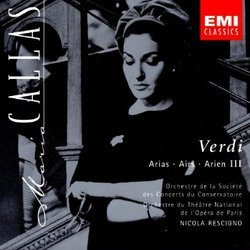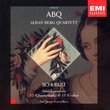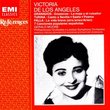| All Artists: Giuseppe Verdi, Nicola Rescigno, Monte Carlo Conservatory Concert Society Orchestra, Paris National Opera Orchestra, Maria Callas Title: Verdi: Arias, Vol. 3 Members Wishing: 0 Total Copies: 0 Label: Capitol Original Release Date: 1/1/1969 Re-Release Date: 1/20/1998 Genre: Classical Styles: Opera & Classical Vocal, Historical Periods, Modern, 20th, & 21st Century Number of Discs: 1 SwapaCD Credits: 1 UPC: 724356646223 |
Search - Giuseppe Verdi, Nicola Rescigno, Monte Carlo Conservatory Concert Society Orchestra :: Verdi: Arias, Vol. 3
 | Giuseppe Verdi, Nicola Rescigno, Monte Carlo Conservatory Concert Society Orchestra Verdi: Arias, Vol. 3 Genre: Classical
|
Larger Image |
CD DetailsSimilar CDs |
CD ReviewsCallas and Verdi; splendour in the twilight Paul A. Tassone | Glenwood, NSW , Australia | 02/15/2006 (4 out of 5 stars) "To correct the review entitled "Callas is still Amazing near the end of her career!", the recordings on this CD were not made by Maria Callas in 1971. Callas made her final recordings for EMI in 1969 (including the Il Corsaro excerpts on this set.) The other items on this set were recorded in 1964-65. Although she did make further studio recordings in 1972 with Giuseppe Di Stefano for the Phillips label, those recordings remain unreleased. And, so to my thoughts on "Verdi Arias III"... Though Callas is perhaps more often associated with Bellini (Norma or Amina), Donizetti (Lucia or Anna Bolena) or Puccini (Tosca), it is the music of Verdi that she most often recorded, committing 6 of his heroines to disc in complete recordings and recording two complete recitals dedicated to his work (1958's "Portrays Verdi Heroines" and 1964's "Callas Sings Verdi.") It was following the recording of her second Verdi recital that Callas began her third recital disc with the material from "Il Trovatore", "Un Ballo in Maschera", "Aida" and "I Vespri Siciliani", all roles she had performed on stage along with the extracts from "I Lombardi" and "Attila." For whatever reason, the recordings were not released at the time. Then, in 1969 after a four year recording hiatus, Callas returned to the studio for more Verdi including the "Il Corsaro" pieces included on this disc. Again, the material was not released at the time. In 1972, Callas allowed some of this material to be released for the first time on the album "Maria Callas By Request." The balance of this material would be released in 1978, a year after her death, on the album "The Legend." Now, all the Verdi on those two albums has been combined into this release. By 1964, Maria Callas was ready to get back to her career, a career that blazed at its zenith in the 1950's but had been severely curtailed during the early 1960's. From late 1963 through to early 1965 she recorded two full operas ("Carmen" and "Tosca") and three new recital discs (the aforementioned "Callas Sings Verdi", "Mozart, Beethoven and Weber Arias" and "Rossini And Donizetti Arias.") This period found the famous voice in somewhat reduced condition but more steady than it had been for sometime. Thus, the bulk of the recordings here find more of the lyric qualities of the voice evident with the heroic scale of the voice of the early years not as apparent. By July 1965, after a final "Tosca" at Covent Garden, Callas stepped away from her career altogether. Then in 1968 she was ready again to resume her career, hoping to make her return in Verdi's "La Traviata." That didn't happen although in the following year she went back to the recording studio again to record Verdi. By this time, the voice was even further reduced in scope, more lyric in quality yet still quite steady and focused. It is interesting to hear Callas in 1964 reinterpreting some of her most celebrated roles as represented by the "Aida", "Trovatore" and "Ballo" arias. Ever the professional, she uses her voice skilfully and while there are moments of vocal discomfort at the very top of the range the middle and lower reaches are if anything more beautiful than before. The blaze of passion at the start of "Ritorna vincitor" that gives way to the resignation of the prayer at the aria's end shows Callas at her most dramatic realising all the possibilities of this great piece. It's a delight to hear her in the "Trovatore", truly a woman in love, adding a new twist to the cadenza that she used in the complete recording showing that she was not simply a creature of habit repeating herself. The "Vespri" piece is one of three versions Callas recorded in the 1960's. This is the best of her attempts at it, reaching down to her lowest recorded note in a voice that sounds like a perfectly tuned cello. The "Attila" piece is lovely, emphasising the lyric qualities of the voice fully and showing that Callas had acquired a new strength in floating the top notes at the top of her range. The "Lombardi" excerpt is perhaps the least pleasing here with the voice sounding dry and hollow in the upper reaches. The 1969 recordings find the voice reduced further and Callas at her most cautious as she navigates her way through these rarities. However, it is essential that we have these pieces as they show this great artist at the very end of what is a truly remarkable recording career still offering interesting and committed performances. I have one caveat in these recordings and that is the amount of editing that was needed to achieve complete performances. This is most apparent in the "Lombardi" extract that combines 1964-65 recordings with 1969 material and the first "Ballo" extract which is a stunning piece of singing, dramatic and resonant yet spoiled by a dreadful top C that has been edited in without much skill. These moments detract it's true but for me anything by Callas is worth listening to. My recommendation: for the Callas fans this CD is a must. Yes, all this material has been released before with the exception of the cabaletta on the second "Il Corsaro" piece which was not completed by Callas; she touches in the high notes rather than singing them full voice. Her intention was to return to the studio for overdubbing but that sadly didn't happen. For those wanting to know what the Callas legend in the music of Verdi is all about, this is not the place to start. The six complete Verdi operas she recorded from the 1950's ("Traviata", "La Forza", "Trovatore", "Aida", "Rigoletto", "Ballo"), the 1958 "Portrays Verdi Heroines" (now titled "Verdi Arias Vol I) or 1964's "Callas Sings Verdi" (now called "Verdi Arias Vol II) provide the evidence of why Callas and Verdi is such an unbeatable combination. " Callas is still Amazing near the end of her career! The Cultural Observer | 01/10/2005 (5 out of 5 stars) "How amazing it is, that during the time this recording was made (1971), Callas was still able to sing these arias with glimmers of glory that made her the Prima Donna Assoluta del Mondo. Her low, chesty notes could impress, and although her high notes were unsteady at this point, they still reflected a myriad of colors belonging only to such a great timbre of a voice. Callas, as Rescigno said, was the female voice. Her talent for breaking down music into phrases for studying, and her ability to color each and every syllable, is simply impressive. One may not think of Ritorna Vincitor as an ideal aria for the condition of her voice at this stage of her career, but what a Ritorna Vincitor it is! Personally, I do not think this rendition of the aria could better her early performances from Mexico and London, so well preserved on other records, but it does in a way outshine the mono recording she makes with Serafin. In fact, I do believe that her interpretation here is much much better than the studio recording of the opera made when her voice was not the thin, bel canto voice that had been the subject of much controversy. Of course, this studio recording with Rescigno was done when she was already incapable of playing much with her instrument. She was just about ready to leave that day, but Rescigno brought a recording made by Regina Crespine, and this blew Callas' top off and provoked her to record a more proper way of singing Verdi and Ritorna. Truly amazing. But still, this recital is a must have for any collector. All these Verdi arias were well-tailored, of course, to suit the deterioration that had horrified us when the voice had begun to fade away, but she undoubtedly still held the genius that made her special. Her aria from I Vespri Siciliani will amaze you, as it showcases the lowest recorded note in her career. She truly had a three octave voice. And you know what? She was the greatest artist of the century, no matter how flawed and tattered her voice was."
|

 Track Listings (9) - Disc #1
Track Listings (9) - Disc #1
